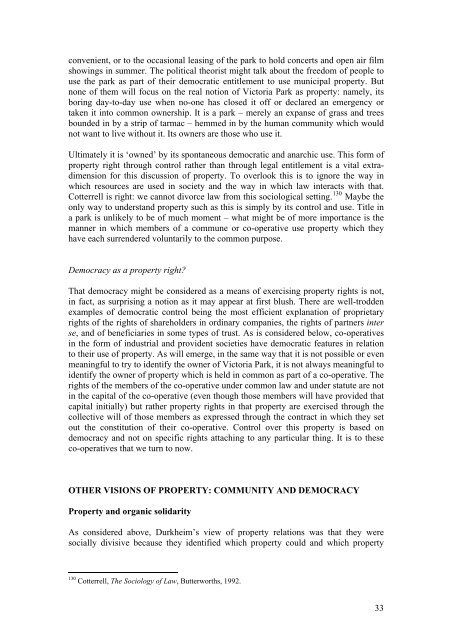The Unbearable Lightness of Property - alastairhudson.com
The Unbearable Lightness of Property - alastairhudson.com
The Unbearable Lightness of Property - alastairhudson.com
Create successful ePaper yourself
Turn your PDF publications into a flip-book with our unique Google optimized e-Paper software.
convenient, or to the occasional leasing <strong>of</strong> the park to hold concerts and open air film<br />
showings in summer. <strong>The</strong> political theorist might talk about the freedom <strong>of</strong> people to<br />
use the park as part <strong>of</strong> their democratic entitlement to use municipal property. But<br />
none <strong>of</strong> them will focus on the real notion <strong>of</strong> Victoria Park as property: namely, its<br />
boring day-to-day use when no-one has closed it <strong>of</strong>f or declared an emergency or<br />
taken it into <strong>com</strong>mon ownership. It is a park – merely an expanse <strong>of</strong> grass and trees<br />
bounded in by a strip <strong>of</strong> tarmac – hemmed in by the human <strong>com</strong>munity which would<br />
not want to live without it. Its owners are those who use it.<br />
Ultimately it is ‘owned’ by its spontaneous democratic and anarchic use. This form <strong>of</strong><br />
property right through control rather than through legal entitlement is a vital extradimension<br />
for this discussion <strong>of</strong> property. To overlook this is to ignore the way in<br />
which resources are used in society and the way in which law interacts with that.<br />
Cotterrell is right: we cannot divorce law from this sociological setting. 130 Maybe the<br />
only way to understand property such as this is simply by its control and use. Title in<br />
a park is unlikely to be <strong>of</strong> much moment – what might be <strong>of</strong> more importance is the<br />
manner in which members <strong>of</strong> a <strong>com</strong>mune or co-operative use property which they<br />
have each surrendered voluntarily to the <strong>com</strong>mon purpose.<br />
Democracy as a property right<br />
That democracy might be considered as a means <strong>of</strong> exercising property rights is not,<br />
in fact, as surprising a notion as it may appear at first blush. <strong>The</strong>re are well-trodden<br />
examples <strong>of</strong> democratic control being the most efficient explanation <strong>of</strong> proprietary<br />
rights <strong>of</strong> the rights <strong>of</strong> shareholders in ordinary <strong>com</strong>panies, the rights <strong>of</strong> partners inter<br />
se, and <strong>of</strong> beneficiaries in some types <strong>of</strong> trust. As is considered below, co-operatives<br />
in the form <strong>of</strong> industrial and provident societies have democratic features in relation<br />
to their use <strong>of</strong> property. As will emerge, in the same way that it is not possible or even<br />
meaningful to try to identify the owner <strong>of</strong> Victoria Park, it is not always meaningful to<br />
identify the owner <strong>of</strong> property which is held in <strong>com</strong>mon as part <strong>of</strong> a co-operative. <strong>The</strong><br />
rights <strong>of</strong> the members <strong>of</strong> the co-operative under <strong>com</strong>mon law and under statute are not<br />
in the capital <strong>of</strong> the co-operative (even though those members will have provided that<br />
capital initially) but rather property rights in that property are exercised through the<br />
collective will <strong>of</strong> those members as expressed through the contract in which they set<br />
out the constitution <strong>of</strong> their co-operative. Control over this property is based on<br />
democracy and not on specific rights attaching to any particular thing. It is to these<br />
co-operatives that we turn to now.<br />
OTHER VISIONS OF PROPERTY: COMMUNITY AND DEMOCRACY<br />
<strong>Property</strong> and organic solidarity<br />
As considered above, Durkheim’s view <strong>of</strong> property relations was that they were<br />
socially divisive because they identified which property could and which property<br />
130 Cotterrell, <strong>The</strong> Sociology <strong>of</strong> Law, Butterworths, 1992.<br />
33













